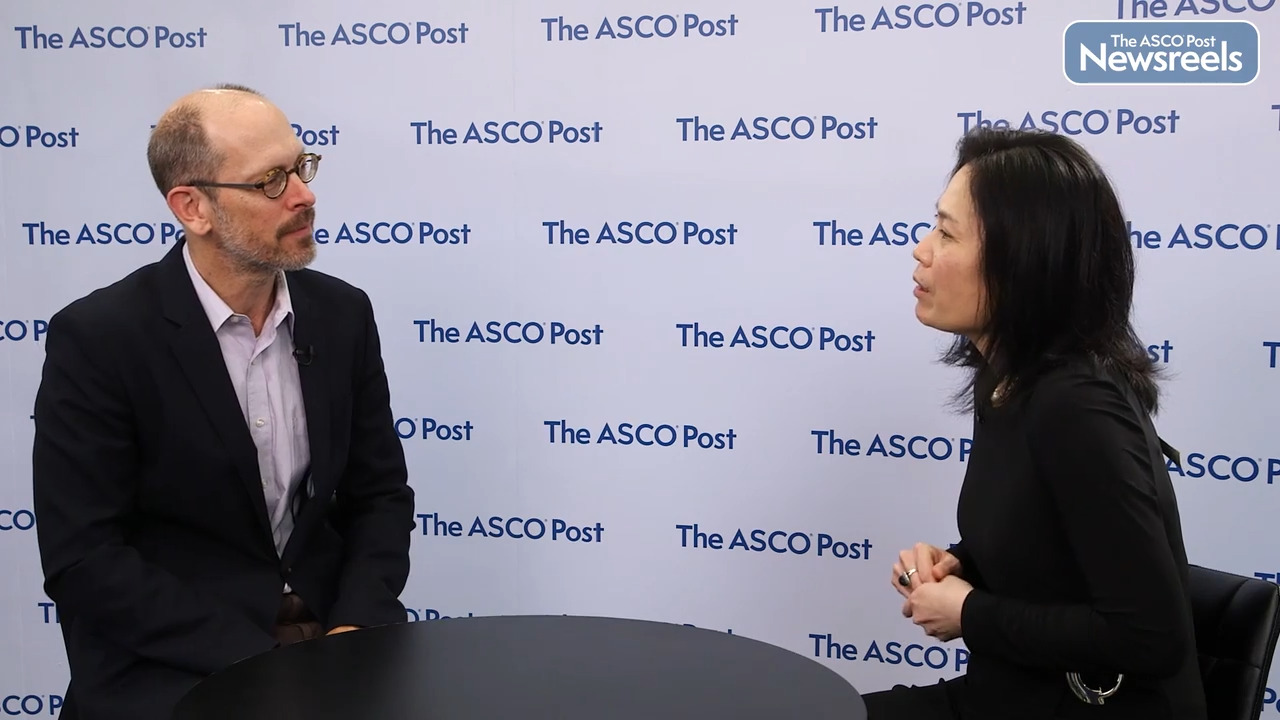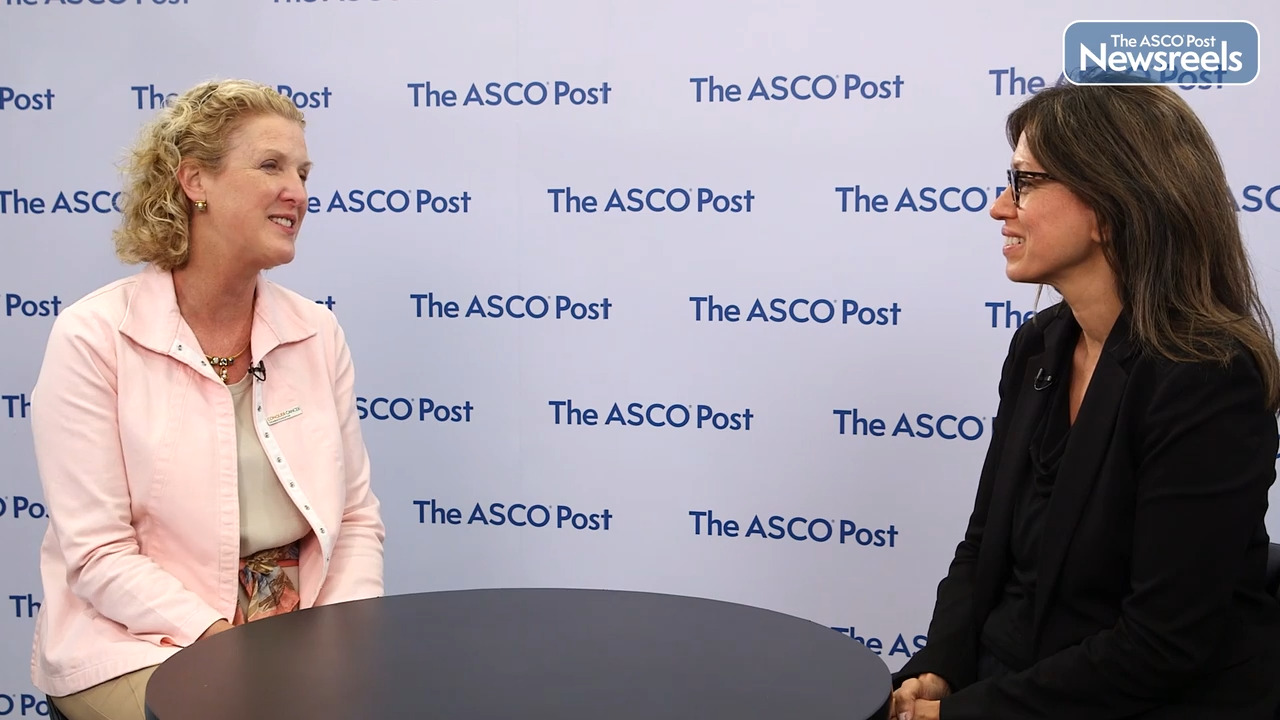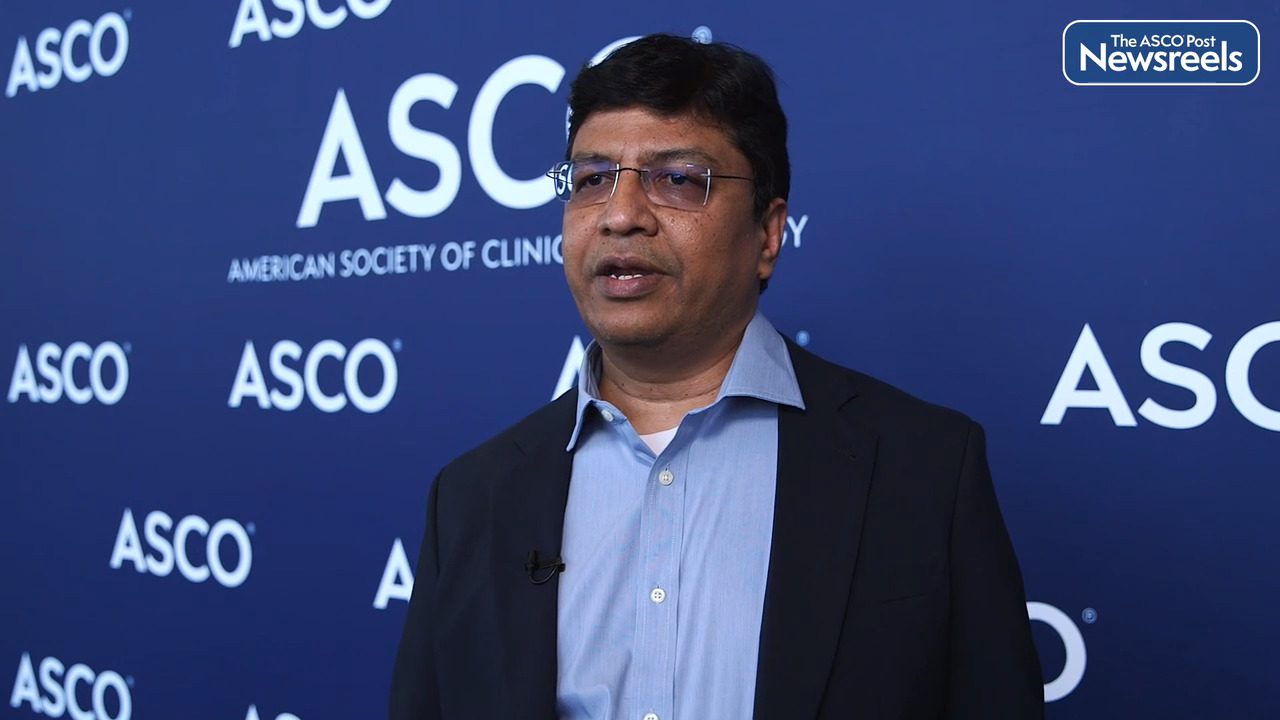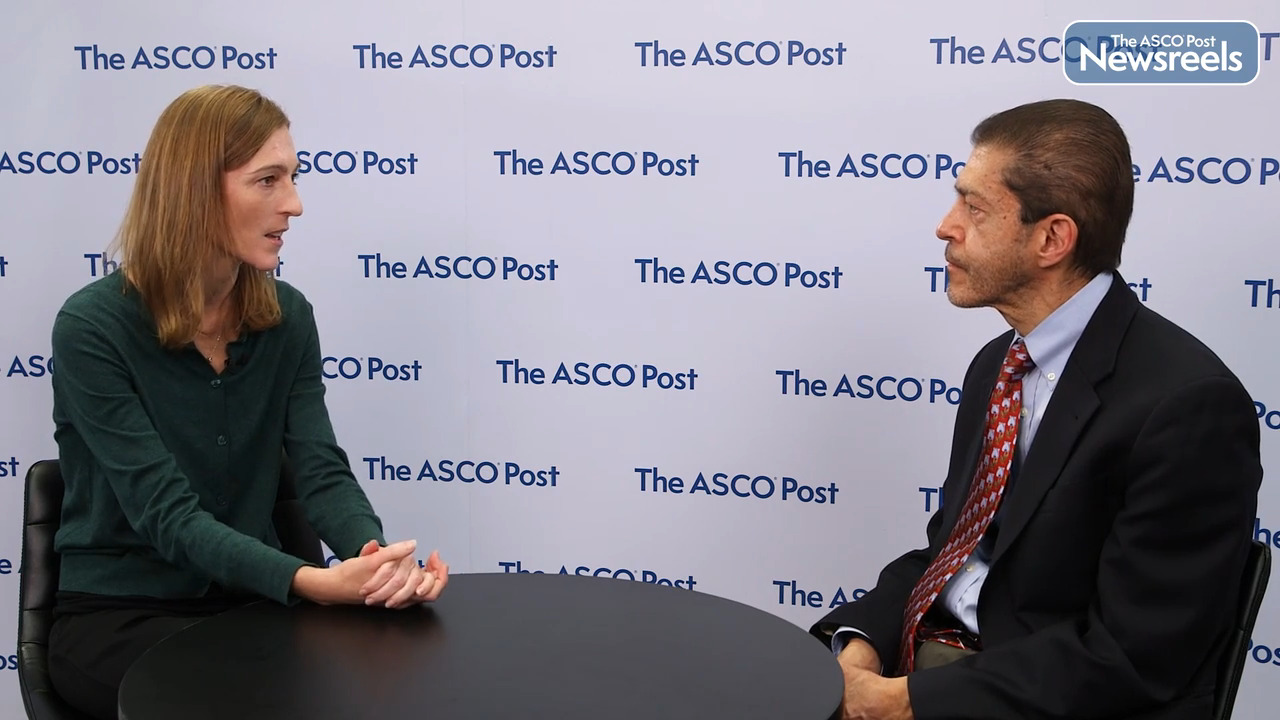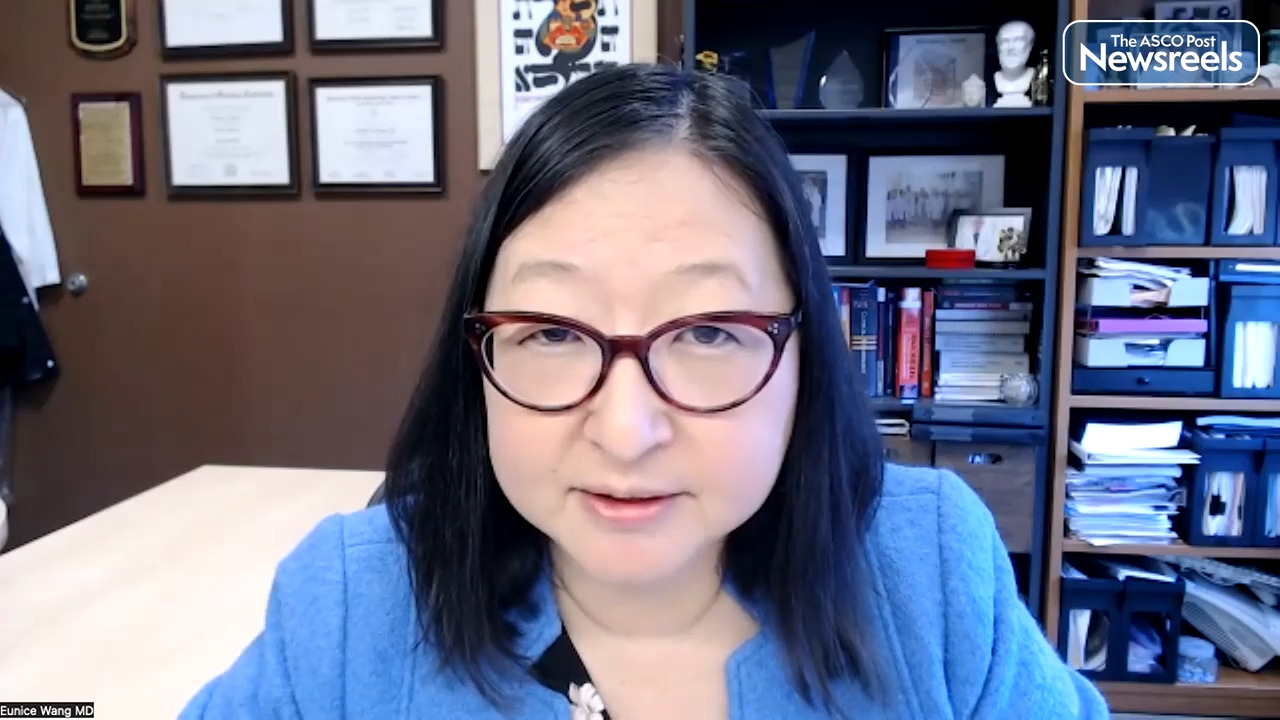Transcript
Disclaimer: This video transcript has not been proofread or edited and may contain errors.
Michael J. Overman:
Smitha, great to see you here in person at, at ASCO in 2022, really exciting. And thanks for kind of helping to kind of lay the groundwork and kind of understanding for EGFR therapy and kind of our management. I looked this up, but you know, our first antiviral therapy was 18 years ago-
Smitha Krishnamurthi:
Wow.
Michael J. Overman:
... FDA approved. So I think kind of a little bit of a testament to our need for clinical trials and kind of learning as we kind of continuously through kind of trials and patients and everything. So, maybe to start us out, let's kind of run through a number of studies that you kind of discussed and kind of inform us. And so one is maybe the triplet study. If you wanted to kind of just lay out the design and the end point and kind of what the result was.
Smitha Krishnamurthi:
Yeah. So the triplet study was for these patients with metastatic RAS and BRAF wild type colorectal cancer allowed enrollment regardless of side, but did stratify by side, and randomly assigned them to FOLFOX panitumumab or FOLFOX Siri panitumumab. So looking at adding irinotecan to increase the response rate. And after up to 12 cycles, patients went on to maintenance five [inaudible] panitumumab, which has been found to be the most effective maintenance therapy.
Smitha Krishnamurthi:
So the objective response rate was the primary endpoint because, as you know, we'd be using this to try to convert patients with unresectable disease to resectable. And the surprising finding, as you know, was that adding irinotecan did not increase the response rate. I think I was shocked to see that. Actually, the results were quite good in both arms. Both arms got 90% of the planned panitumumab dose. So it leaves me wondering maybe there might have been some dose delays for mylo suppression that could have allowed the rash to recover. Some other studies have found similar numbers in terms of the incidents being higher with a doublet than with triplet. So he beats the dose delays. Have you ever tried full FOLFOX Siri with an EGFR antibody?
Michael J. Overman:
You know, I have not. I've kind of the FOLFOX Siri bevacizumab, classically. Kind of the triplet combination I go to. And so maybe we can switch gears. And so strategic study was a very interesting one, cause it was kind of not just one point in time, but the whole like kind of management kind of approach. And so maybe real quickly just kind of the layout of that study and then kind of the outcome from it.
Smitha Krishnamurthi:
Yeah. So that was like a really interesting trial. It must have been daunting to set up because it was compared to strategies. So RMA was a two line strategy, the FOLFIRI with cetuximab followed by a FOLFOX bevacizumab, compared with RMB, which was a three line. So optimox, bev, then second line, FOLFIRI bev. So bev beyond progression and then saving the EGFR antibody for third line, which I think, would you agree? Is that what most of us have been doing?
Michael J. Overman:
I think a lot of us have the tendency to save something or always have something for later, and I've always wondered if that's the right approach or not. Yeah,
Smitha Krishnamurthi:
Yeah, exactly what the study was trying to answer. They postulated that three lines of treatment would have longer duration disease control, and another surprise in this study, there was no difference in duration disease control.
Michael J. Overman:
Yeah. Yeah. How about the last study you discussed? The improved study, which actually looked at kind of treatment-free intervals. So maybe just real quick, the design there and outcome there.
Smitha Krishnamurthi:
Yeah. So that was a study where everyone started off with FOLFIRI Panitumumab, had eight cycles. And so if they were stable or responding, then were randomized to continue on treatment until progression or go on observation. And then when they progressed, go back on treatment. And what was interesting was that the endpoint was looking at progression-free survival on treatment. So they didn't count progression of occur during the treatment-free interval because certainly that would be shorter, but they're really looking to see when does a regimen become inactive?
Michael J. Overman:
Sure. Okay. Gotcha.
Smitha Krishnamurthi:
Yeah. And then the surprising finding was that, for patients in left sided tumors, the progression free survival on treatment was like 20 months median. So it looks like in these patients, the regimen can remain active for quite a long time.
Michael J. Overman:
Okay. So they looked at a treatment free interval, but maintenance therapy. Does that have a role to play, do you think?
Smitha Krishnamurthi:
Oh yeah. So, that would be like another question to ask. Which would be better, maintenance versus treatment free? Which we can't tell from this study. But the benefit of this approach is that the patients had a lot of time off treatment. So the median number of cycles was 13 in both arms. So for six and a half months. And the PFS on treatment for everyone was median 17 months, so they had a significant amount of time off treatment.
Michael J. Overman:
Which, which is a real benefit, right? Yes. Yeah. So, the last abstract that it kind of related was the paradigm, which was kind of shown here, which looked at EGFR versus [inaudible] for frontline therapy with FOLFOX pam, FOLFOX bev, and improvement in overall survival. So, kind of really setting us up for this question, which is, so what is your kind of practice here in this left sided RAS RAF wild type population? What should we be doing? Is it doublet EGFR? Is that really kind of rising to the top of the list? Or what would you say?
Smitha Krishnamurthi:
Yeah. So I think we have to reevaluate what we're doing. I tended to treat a lot with bevacizumab and FOLFOX. I have a lot of patients who like to avoid the rash from the EGFR antibody. I'm sure you do too. But I think in light of paradigm, I have to advise patients now that there really is a survival improvement. The median was three months, but there's also that 11% more alive at five years that was shown. So I'm planning to share that with patients and share the toxicities and see what they want to do. I think for somebody who wants to avoid the E GFR rash, it's not unreasonable if they didn't want to do that first one.
Michael J. Overman:
Gotcha.
Smitha Krishnamurthi:
What do you think? [inaudible]
Michael J. Overman:
No. I mean, I agree with you. I think the doublet EGFR, there's been consistency kind of growing. And I think it's becoming much more of a higher use item on my list of discussions with patients. But I still think there is clearly a toxicity quality of life question that comes up. So, [inaudible] thanks so much.
Smitha Krishnamurthi:
Thank you, Mike.
Michael J. Overman:
Really glad. Good to be here with you in person.
Smitha Krishnamurthi:
It was great talking to you. Thank you.
